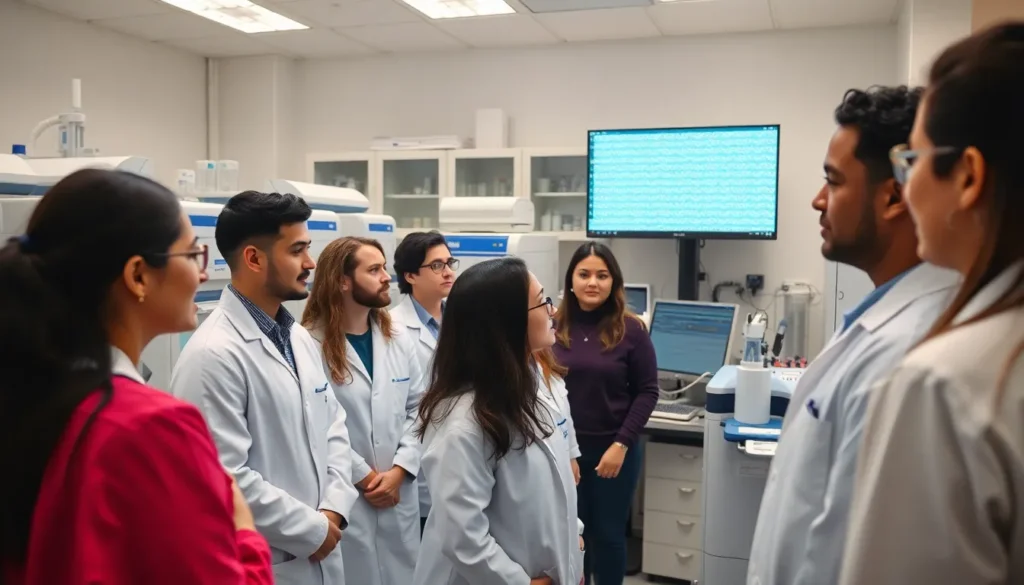In the rapidly evolving world of genetics, genome sequencing stands out as a groundbreaking tool that unlocks the mysteries of life at a molecular level. By deciphering the complete DNA sequence of an organism, scientists can gain invaluable insights into everything from hereditary diseases to evolutionary biology. This technology is revolutionizing medicine, agriculture, and environmental science, paving the way for personalized treatments and innovative solutions to global challenges.
As the cost of sequencing continues to drop, its applications are becoming more accessible, sparking a surge of interest across various fields. Researchers and healthcare professionals are harnessing this powerful technology to better understand genetic variations and their implications. With the potential to transform how we approach health and disease, genome sequencing is not just a scientific advancement—it’s a key to a healthier future.
Table of Contents
ToggleOverview of Genome Sequencing
Genome sequencing refers to the process of determining the complete DNA sequence of an organism’s genome. This includes both the coding and non-coding regions of DNA, providing a comprehensive view of genetic information. Advances in technology have reduced the cost and time necessary to sequence genomes, making it accessible for various fields.
Techniques used in genome sequencing include Sanger sequencing and next-generation sequencing (NGS). Sanger sequencing offers high accuracy for short DNA fragments, while NGS facilitates the rapid sequencing of entire genomes by analyzing millions of fragments simultaneously.
Genome sequencing enables researchers to identify genetic variations linked to diseases, paving the way for personalized medicine. Such insights help in developing tailored treatments that can improve patient outcomes. The study of genomic data also supports research in evolutionary biology, helping scientists trace lineage and understand species development.
Applications extend beyond medicine. Agriculture benefits from genome sequencing through the development of crops with desirable traits, such as drought resistance or pest tolerance. Environmental science leverages this technology to monitor biodiversity and assess ecosystem health.
Genome sequencing serves as a foundational tool in modern biology and medicine, offering invaluable insights that influence research, healthcare, and conservation efforts.
Types of Genome Sequencing

Genome sequencing encompasses various techniques, each serving specific purposes in genetic research and medicine. This section outlines three primary types: whole genome sequencing, exome sequencing, and targeted sequencing.
Whole Genome Sequencing
Whole genome sequencing (WGS) captures the complete DNA sequence of an organism’s genome, including all coding and non-coding regions. This method enables comprehensive analysis of genetic variations, which helps identify mutations responsible for hereditary diseases. WGS is crucial for understanding complex traits and diverse diseases due to its ability to provide a holistic view of an organism’s genetic makeup. Studies using WGS often lead to significant discoveries in fields such as cancer genomics and rare genetic disorders.
Exome Sequencing
Exome sequencing focuses specifically on the exons, the coding regions of genes. While exons comprise only about 1% of the human genome, they account for the majority of known disease-causing mutations. This targeted approach reduces the volume of data generated compared to WGS, making it more cost-effective for identifying gene variants linked to specific conditions. Exome sequencing is particularly valuable in clinical settings for diagnosing genetic disorders and guiding therapeutic approaches.
Targeted Sequencing
Targeted sequencing zeroes in on specific regions of interest within the genome, often selected based on prior research or clinical relevance. This method enhances efficiency by concentrating resources on areas with high mutation rates associated with particular diseases. Targeted sequencing is useful for large-scale population studies and clinical trials, allowing researchers to identify genetic markers that can predict treatment responses or disease susceptibility. By reducing the cost and time required compared to broader sequencing techniques, targeting specific genes streamlines genetic research while producing actionable insights.
Applications of Genome Sequencing
Genome sequencing serves diverse applications across various fields, significantly enhancing our understanding and capabilities in medicine, research, and agriculture.
Medical Diagnostics
Medical diagnostics leverage genome sequencing to identify genetic disorders and predisposition to diseases. This technology enables the detection of mutations associated with conditions like cystic fibrosis and certain cancers. By analyzing individual genomes, healthcare providers can pinpoint specific genetic markers, leading to timely diagnoses and appropriate interventions.
Personalized Medicine
Personalized medicine utilizes genome sequencing to tailor treatments based on a patient’s genetic makeup. Through this approach, clinicians determine the most effective therapies for individuals, minimizing adverse effects and maximizing therapeutic benefits. For example, patients with specific mutations in the EGFR gene may respond better to targeted therapies in lung cancer, illustrating the advantages of customized treatment plans.
Research and Development
Research and development benefit from genome sequencing by facilitating discoveries in genetic research, drug development, and agricultural improvement. In genetic research, scientists explore gene functions and associations with diseases. Developers utilize this knowledge to create innovative drugs that target specific genetic profiles, enhancing treatment efficacy. In agriculture, genome sequencing aids in producing genetically modified organisms (GMOs) with desirable traits, such as drought resistance and increased yield, ensuring food security in changing climates.
Challenges in Genome Sequencing
Genome sequencing faces several challenges that can hinder its application and effectiveness in various fields. Key concerns include data privacy and technical limitations that require ongoing attention.
Data Privacy Concerns
Data privacy issues arise from the sensitive nature of genetic information. As genome sequencing becomes more prevalent, the risk of unauthorized access to individuals’ genetic data increases. Genetic information can reveal significant insights into personal health, ancestry, and predisposition to diseases. Without robust data protection protocols, misuse of this information could lead to discrimination in employment, insurance, and healthcare. Ensuring informed consent and secure data storage are crucial to maintaining trust between individuals and research institutions.
Technical Limitations
Technical limitations impact the accuracy and efficiency of genome sequencing. These include issues related to sequencing errors, coverage gaps, and variations in interpretation of results. Specific types of variations, such as structural variants, can be challenging to detect with certain sequencing technologies. Additionally, the sheer volume of data generated requires advanced computational tools for analysis and interpretation, complicating the process. Continuous advancements in technology and algorithms are necessary to address these limitations and improve the reliability of genomic findings.
Future of Genome Sequencing
Advancements in genome sequencing promise to reshape multiple sectors, including healthcare, agriculture, and environmental science. Expect a significant reduction in sequencing costs over the next few years, making technology accessible for broader applications. Increased participation from both private and public sectors fuels ongoing research and innovation.
Integration of artificial intelligence (AI) simplifies data analysis in genome sequencing. AI algorithms can efficiently process complex genetic data, leading to faster identification of genetic mutations associated with diseases. These technologies enhance the accuracy of personalized medicine approaches, optimizing treatment plans for individual patients.
Moreover, collaborative global initiatives aim to create extensive genetic databases. These databases would facilitate research on genetic diversity across populations. Insights gained from these studies can drive improvements in healthcare, especially in understanding population-specific health risks.
Emphasis on ethical frameworks around genome sequencing grows alongside technological progress. Researchers and regulatory bodies must prioritize data privacy and consent issues. Developing secure data handling methods helps address concerns regarding misuse of genetic information.
Innovations in sequencing techniques, such as long-read sequencing, also hold promise. Long-read sequencing captures larger fragments of DNA, providing clearer insights into complex genomic regions. This advancement aids in uncovering structural variants that traditional methods might miss, enhancing understanding of various diseases.
In agriculture, genome sequencing helps in developing resilient crops. Future improvements in sequencing technology will enable rapid identification of beneficial traits. Cultivating crops that withstand environmental stresses can address food security challenges, especially in changing climates.
Overall, the future of genome sequencing hinges on continuous technological advancements, ethical considerations, and collaborative efforts across sectors. As research progresses, the benefits of genome sequencing are expected to expand significantly, leading to transformative impacts on society.
Genome sequencing stands at the forefront of scientific innovation with the potential to revolutionize various fields. Its ability to unlock the mysteries of DNA paves the way for breakthroughs in personalized medicine and agricultural advancements. As technology evolves and costs decrease, the accessibility of genome sequencing will only increase, fostering further exploration and application.
However, navigating the challenges of data privacy and technical limitations remains essential. The future promises exciting developments that will enhance understanding of genetics while ensuring ethical considerations are prioritized. With ongoing collaboration and innovation, genome sequencing is set to play a pivotal role in shaping a healthier and more sustainable world.










